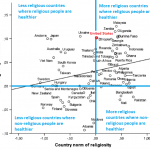New Year’s Day is closing in fast – so it must be annual round-up time! Here’s the research news on psychology of belief and non-belief that I found most interesting over the past year – the top 10 – and in reverse order, naturally.
10. Conspiracy theories flourish when people feel like things are slipping out of control
Mining data from a 15-year old survey revealed that people who felt least able to keep on top of the infamous ‘Millenium Bug’ were also the most likely to believe a whole host of different conspiracy theories. This adds to the growing pile of evidence that people who don’t feel in control of their surroundings are more likely to ‘invent’ comforting rationalizations to try to make sense of the world.
9. State and religion: a tale of waning influence and modern resurgence
A historical analysis of the past 1000 years of civilisation showed a massive decoupling of state and religion that began in the West in the 17th century and spread to the rest of the world in the 19th and 20th centuries. It also showed that the trend has reversed in recent decades, mainly in majority Muslim countries.
8. Most supernatural beliefs are about avoiding harm, not bringing benefit
A cross-cultural survey found that superstitious beliefs are likely to be about ways to avoid harm, rather than to bring good fortune. It also revealed that fake news stories about hazards were more believable than ones about good news. All this provides more support for the idea that people develop supernatural beliefs as a way to try to make themselves feel safer.
7. What do people think God is actually like?
Contrary to previous research, this new study found that adults don’t tend think of gods in a ‘minimally counter-intuitive’ way. Actually what seems to be happening is that people happily hold a range of irreconcilable beliefs about their gods, and that they don’t notice the incongruity simply because they don’t think about it too hard.
6. A world by design – even atheists intuitively think the natural world has a designer
When under time pressure, both atheists and believers make fundamental logical errors about the the world around us. This is the best study to date showing that all of us have a tendency to see the world as being designed, but that atheists over-ride those natural instincts.
5. Did belief in ghosts help kick-start civilization?
A detailed analysis of the wide variety of cultures spread across the Pacific Ocean found that, contrary to previous wisdom, belief in so-called ‘moralising high gods’ does not seem to be a necessary first step for the development of big, complex societies. It does seem, however, that popular belief in ancestral spirits is a necessary prelude to allow a narrow political elite to take power.
4. Religious authority increases the number of donations but decreases the value
A clever study on itinerant labourers in Afghanistan found that, when appeals for charitable donations were made by someone dressed as an Imam, the number of donations rose but their average value actually decreased. It seems that reminding people that god is watching them encourages them to fulfil the letter of their religious obligations, but undermines the ethical and moral motivation.
3. The statistics are clear: a cultural shift away from religion is under way in the USA
A new analysis of a massive survey of over 11 million school-age Americans found that they are increasingly saying that religion is simply unimportant in their lives. What’s more, as they leave the parental home they are dropping religion in large numbers – a strong indicator that there is a major change afoot in the USA.
2. In the face of discrimination, non-believers commit more strongly to their atheism
A survey of nearly 1,000 self-identified atheists in the USA revealed that atheists who feel that they are the victims of discrimination were also the most likely to identify strongly as atheists. This suggests that atheist groups can form a valuable support network.
1. Countries free of religion are the most socially advanced, data show
My analysis of the latest data from the Social Progress Index found that countries that scored most highly also tended to be the least religious. That’s not too surprising, given that people suffering poverty or repression tend to latch onto religion. But it’s always interesting to see it supported by cold, hard facts! And it was by a long stretch the most widely shared Epiphenom post from 2015.
The long read
If that whet your appetite, be sure to check out two editorial posts that covered a couple of topics in more detail, bringing together and summarizing in one place all the relevant research that’s been covered in Epiphenom over the years: The science is in, and God is not the answer (a rebuttal of an article in a popular Canadian magazine claiming that science supports the idea that religion makes for better people), and America is finally losing its religion – and that’s a good thing! (my contribution to a Patheos series on the implications of the monumental Pew Religion Survey).
And of course there are also all the annual reviews from previous years: 2014, 2013, 2012, 2011, 2010, and 2009.
Enjoy – and have a very Happy New Year!















